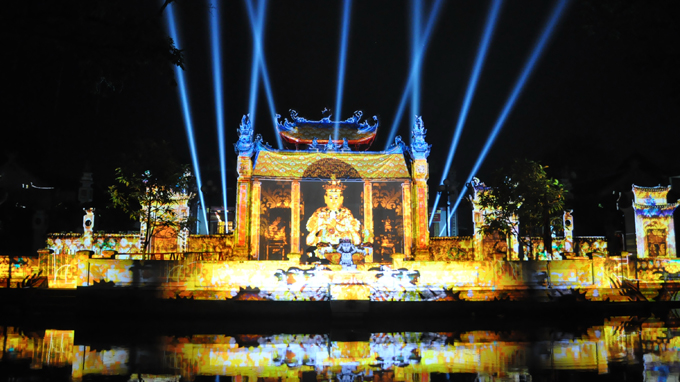Controversy regarding the “light feast” at the Founder Lac Long Quan Temple Festival in Hanoi is the latest example of a clash between the need to preserve and re-create traditional festivals as they originally were, and the desire to incorporate elements of contemporary art.
Also known as Binh Da Village Festival, the Founder Lac Long Quan Temple Festival, which was recently recognized as a national intangible cultural heritage by the Ministry of Culture, Sports and Tourism, ran in Binh Minh Commune in Thanh Oai District from April 3 to 6.
Unlike in previous years when the festival was held by Binh Da villagers, this year the Thanh Oai People’s Committee undertook the organization in coordination with the National Art and Culture Institute.
The controversial “light feast”
The century-old festival has been of particular significance to locals’ spiritual life for centuries.
The temple to Founder Lac Long Quan, Vietnamese people’s legendary father, was recognized as a national historical and cultural relic in 1985.
Alongside the time-honored rituals and activities, this year’s festival boasted two special items: a laser light performance and a contemporary calligraphy display, which are both the brainchild of Associate Professor Bui Quang Thang of the National Art and Culture Institute.
This was the first time such a compelling laser light performance supported by high-end technology had been held at a national historical relic, Thang said prior to the festival.
Nine high-capacity laser devices were placed in the temple’s front yard, emitting dazzling beams of light.
The yard and the temple front were covered with a large piece of white cloth, a backdrop for the light to “dance” on. A system of high-capacity loudspeakers was also installed.
Though the advertisement of such contemporary art elements drew large crowds of curious visitors, most of them expressed frustration at the deafening dance music typical of bars and discotheques that was emitted from large speakers.
Other examples
Other examples of these “renovations” include the modern changes to northern Ha Nam Province’s Tich Dien and Lanh Giang festivals in 2009.
The festivals saw contemporary artists perform body painting, video art, and electronic music.
These changes drew curious audiences, but also attracted criticism from experts and many audience members.
Despite the success of past Hue Festivals, Hue’s iconic art festival, complaints have been voiced regarding the loss of solemnity and inherent grace at the Hue Royal Palace during the festival, when crowds, decorations, and performances take over the usually serene, solemn grounds.
This year’s Hue Festival, poised to run from April 12 to 20, has already drawn flocks of domestic tourists and foreigners.
For
“It’s time that we made modern changes to traditional festivals if they’re to survive in today’s world. What’s the point of holding traditional festivals that appeal to few people? It would be a huge waste of money, resources, and time,” Thang said, remarking on the “light feast” show at the Founder Lac Long Quan Temple Festival in Hanoi.
Thang also served as the general director of Ha Nam Province’s Tich Dien and Lanh Giang festivals in 2009.
“Revenues are one of the key benchmarks of how successful a festival is, which in turn are re-invested to preserve the festival,” he noted, urging that organizers, visitors, and critics of traditional festivals should be more receptive to modern changes.
He also pointed out that the contemporary art performances have nothing to do with the festivals’ traditional core, thus not undermining their solemnity at all.
French expert Philippe Bouler, nicknamed “Mr. Festival,” who has recently been conferred with a medal by the Hue government for his massive contributions to the city’s Hue Festival since its 1992 inauguration, is of the same opinion.
“All countries with a deep history and active art scene must address these concerns. In my opinion, we shouldn’t be too rigid about relic preservation and contemporary art performance, but should integrate them instead,” Bouler noted.
He added that though Vietnam and Hue in particular boast a rich history, both tangible and intangible, it is essential that such a strong heritage be incorporated into modern culture by celebrating contemporary art and involving young, gifted artists.
Meanwhile, Paul Marcel, a French postgraduate who is working on his doctoral dissertation on Vietnamese festivals, noted that all experiments are criticized at some point.
“Preserving traditional festivals by incorporating modern elements is a positive tendency which has been successfully adopted by many countries. I think that if contemporary artists actually spend some time in the environment of the festivals, they would be able to create even more valuable works,” he observed.
Against
On the other hand, many local experts have voiced their strong disapproval of the modern changes to traditional festivals.
“In my opinion, the original rituals and activities at traditional festivals should be retained as they were some hundreds years ago. Of course we’re always receptive to changes, but I haven’t noticed the connection between the old and new elements,” shared Dr. Nguyen Quoc Tuan, head of the Religion Research Institute.
Agreeing with Dr. Tuan, Prof. Ngo Duc Thinh, former head of the Vietnam Culture Research Institute, said that if Vietnam keeps modernizing its age-old festivals, in 20 or 30 years the next generations would not have a clue what the original festivals celebrated in the first place.
Like us on Facebook or follow us on Twitter to get the latest news about Vietnam!


















































